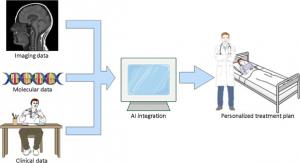A Chinese Neurosurgical Journal Review Describes the Transformative Role of Artificial Intelligence in Glioblastoma
Researchers conduct review of literature to highlight the benefits of artificial intelligence in glioblastoma management
BEIJING, BEIJING, CHINA, August 7, 2025 /EINPresswire.com/ -- Glioblastoma (GBM), which represents the most common type of brain cancer, is characterized by rapid proliferation and a highly malignant nature. While improvements in treatment approaches to counter the rapid progression of GBM, such as neurosurgical procedures, radiotherapy (RT), and chemotherapy (CRT), have been made, patients with GBM often have a poor median survival time of around 15 months. The complex nature of GBM, with significant variation within and between tumors and the presence of blood–brain barrier, makes treatment challenging and necessitates innovative and personalized approaches to improve outcomes.In recent years, researchers across the globe have increasingly explored the use of digital tools to advance the field of medical oncology. One such transformative tool currently being investigated in preclinical studies and clinical practice is artificial intelligence (AI). In a new study, a team of researchers led by Dr. Alen Rončević from the Department of Neurosurgery, University Hospital Center Osijek, Croatia, has conducted a review of literature to highlight the advantages of AI in GBM treatment and care. Their review article was published online in the Chinese Neurosurgical Journal on 02 June, 2025.
“By leveraging big data and advanced computational models, AI has demonstrated significant potential to revolutionize the diagnosis, treatment, and monitoring of complex diseases like GBM. From improving on radiological imaging to paving the path for personalized treatments, AI is reshaping the field of neuro-oncology,” says Dr. Rončević, emphasizing the transformative nature of AI.
In their study, the researchers initially examined the critical role of AI in GBM diagnosis. At present, the diagnosis of GBM relies on tissue samples obtained during tumor resection. Preoperative imaging technologies, including computed tomography and magnetic resonance imaging (MRI), can provide a preliminary diagnosis of GBM. However, through the use of AI, the accuracy of GBM diagnosis based on preoperative imaging was found to be enhanced, as AI algorithms can detect subtle tumor features that may be missed during traditional radiological interpretation by a radiologist.
Another key application of AI in GBM diagnosis is radiomics, which involves the extraction of quantifiable data characteristics from radiological images. Notably, AI could significantly improve the process of segmentation, which is an otherwise time-consuming technique, to distinguish tumor tissue from normal tissue. “AI-based models can differentiate between GBM and other types of brain lesions, predict tumor grade and prognosis, evaluate treatment response, and assess tumor subtypes non-invasively,” comments Dr. Rončević.
Subsequently, the researchers revealed the importance of AI technologies in GBM treatment planning. Advanced AI algorithms based on convolutional neural networks and deep learning models could provide real-time surgical guidance that improves patient outcomes. Another key application of AI was in enabling personalized treatment of CRT agents for patients with GBM. In-silico computational models built on AI were found to be efficient in predicting the therapeutic response of GBM tumors to CRT drugs.
To specifically address the poor median survival time associated with GBM, the team utilized preoperative MRI data and machine learning-based classifiers to predict molecular characteristics of the tumor and the overall survival time. Such models could be tweaked to analyze comprehensive clinical data to produce personalized survival curves. Furthermore, AI technology could predict the recurrence patterns in patients with GBM.
Describing the benefits of AI in aiding the discovery of new GBM drugs, Dr. Rončević states, “Traditional drug discovery is a costly and lengthy process, but AI-based approaches could
significantly reduce this timeframe. By analyzing properties of a drug and molecular interactions with tumor cells, AI algorithms could suggest which existing drugs might be effective against GBM.”
In summary, the evolving and ever-expanding AI-based technologies are vital to advancing GBM-related treatment and care.
***
Reference
Title of original paper: Artificial Intelligence in Glioblastoma—Transforming Diagnosis and Treatment
Journal: Chinese Neurosurgical Journal
DOI: https://doi.org/10.1186/s41016-025-00399-2
About the University
University Hospital Centre Osijek - KBC Osijek is the biggest public hospital in eastern Croatia. It provides comprehensive medical services across surgery, internal medicine, pediatrics, gynecology, oncology, neurology, nuclear medicine, and supporting specialties with full ambulatory care for outpatients.
Website: https://www.kbco.hr/
About Dr. Alen Rončević from University Hospital Center Osijek
Dr. Alen Rončević is a Neurosurgery resident at the University Hospital Center Osijek, Croatia.
Funding information
This research received no funding.
Yi Lu
Chinese Neurosurgical Journal
1059978478 ext.
luyi617@sina.cn
Legal Disclaimer:
EIN Presswire provides this news content "as is" without warranty of any kind. We do not accept any responsibility or liability for the accuracy, content, images, videos, licenses, completeness, legality, or reliability of the information contained in this article. If you have any complaints or copyright issues related to this article, kindly contact the author above.

